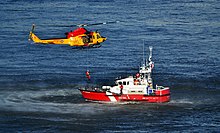User:Eleanor Dampier/sandbox
 | This is a user sandbox of Eleanor Dampier. You can use it for testing or practicing edits. This is not the sandbox where you should draft your assigned article for a dashboard.wikiedu.org course. To find the right sandbox for your assignment, visit your Dashboard course page and follow the Sandbox Draft link for your assigned article in the My Articles section. |
Water police, also called harbor patrols, port police, marine/maritime police, nautical patrols, bay constables, river police, or [maritime law enforcement] are police officers, usually a department of a larger police organization, who patrol in water craft. Their patrol areas may be coastal sea waters, rivers, estuaries, harbors, lakes, canals or a combination of these.
Contents
[edit]Duties and functions[edit]
[edit]
Water police are usually responsible for ensuring the safety of water users, enforcing laws relating to water traffic, preventing crime on vessels, banks and shores, providing search and rescue services (either as the main provider or as an initial response unit before more specialized units arrive), and allowing the police to reach locations not easily accessible from land. They may also be responsible for coastal security, environmental law enforcement, immigration and smuggling patrols, and diving search operations (although many police organizations have separate units to handle this). Their operations may coordinate with other agencies with similar assets such as in the United States the various Federal, State or Local authorities may work together to promote or achieve similar enforcement or rescue outcomes. In the United States, a number of states have combined the duties of water police with those of conservation officers.[1] [Added citation] [Added image] A rigid-hulled inflatable boat (RHIB) [is] used by the UK's North West Police Underwater Search & Marine Unit. It is marked as both POLICE and HEDDLU, as it operates in both England and Wales.

Equipment ranges from personal water craft and inflatable boats to large seagoing craft, but most police vessels are small to medium, fast motorboats. In some areas these vessels incorporate a firefighting capability through a fixed deck nozzle.[2] The operators of these vessels are generally trained in many rescue disciplines including [first aid], vessel dewatering[3], and firefighting. They may also be rescue and scuba divers who are specially trained and also boat operators who may engage in towing operations. [Added citation]
- Added "maritime law enforcement" to list of water police synonyms
- Added citation for marine officer duties
- Added RHIB image
- Added minor grammar edit for third paragraph
- Added citation for fixed deck nozzle/deck guns
- Added link for first aid
- Added citation/link for vessel dewatering
- Added image of rescue exercise
- ^ "Marine Patrol Officer Duties and Resonsibilities: Maine Department of Marine Resources". www.maine.gov. Retrieved 2021-12-01.
- ^ "Deck Guns: Know Your Flow". Fire Engineering. 2019-10-01. Retrieved 2021-12-01.
- ^ "Dewatering Control System". seapart.com. Retrieved 2021-12-01.
